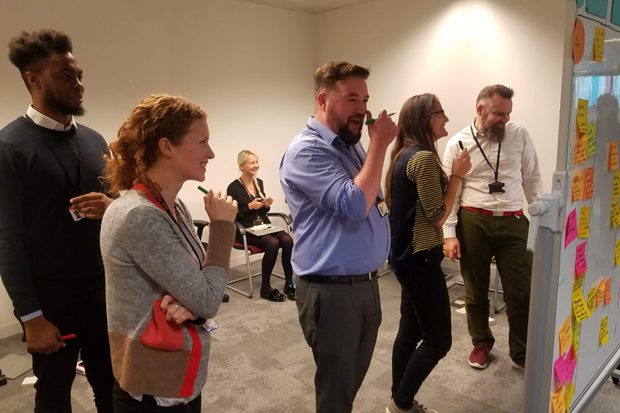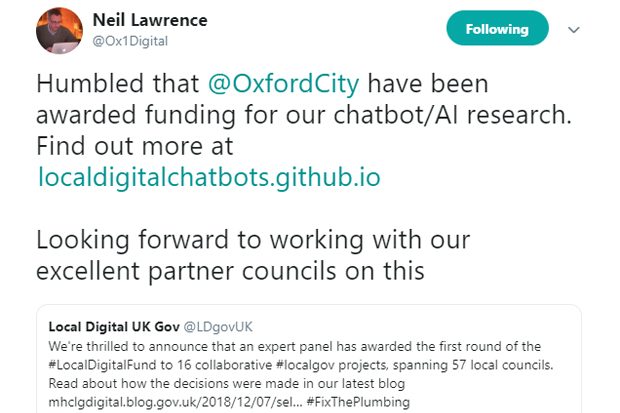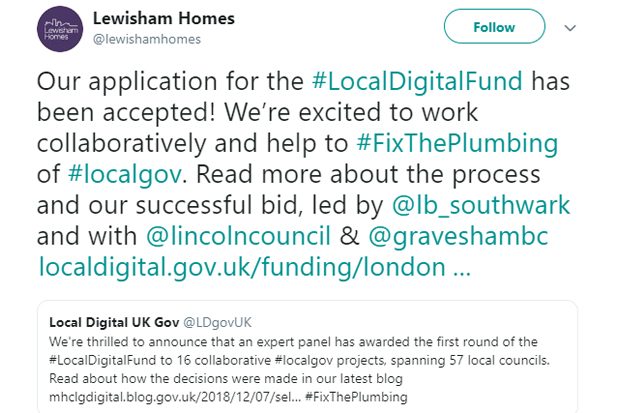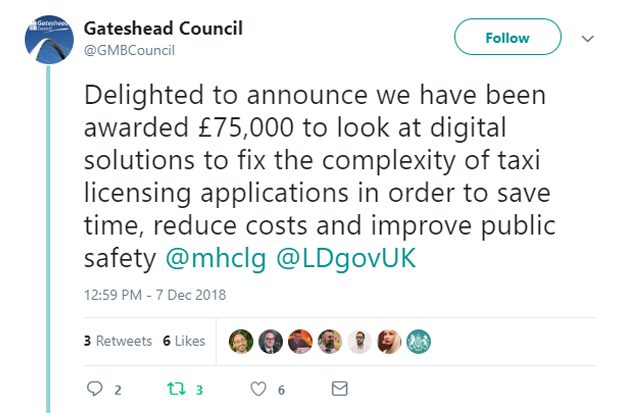
Today we’re delighted to announce that we’ve funded 16 projects through the first round of the Local Digital Fund… and there will be more. Overall, 57 local authorities are named partners on these bids, and we’re going to do our best to help others input to and learn from these projects as they develop over the coming months.
In this blog post, we wanted to share this first list of Fund beneficiaries and explain what happens next – for those funded, and for those not on the shortlist this time around.
Firstly, as highlighted by our independent review panel in their blog post, there were a lot of great bids in the mix. Even though we couldn’t fund them all, we’re excited for their potential in the future. Let’s start with the successful bids.
Funded ‘Discovery’ projects
- Birmingham City Council and 2 partners were awarded £69,300 to investigate how the use of virtual assistants or chatbots, such as Amazon’s Alexa or Apple’s Siri, could improve the provision of care for people in need.
- London Borough of Southwark and 3 partners were awarded £78,000 to understand the software ecosystem needed to unlock the potential for transformation in town planning.
- Greater Manchester Combined Authority and 3 partners were awarded £80,000 to understand how better uses of children’s services data could help staff make better decisions and deliver better outcomes for children.
- Sunderland City Council and 4 partners were awarded £77,000 to learn how to allow people moving into a council’s jurisdiction to contact the council just once to have all their services - including council tax, bin collections, and possibly benefits - set up.
- North East Lincolnshire Council and 4 partners were awarded £52,103 to look at how the Government’s online payment service for government and public sector organisations - GOV.UK Pay - can be adopted more easily to help councils save money.
- Worcestershire County Council and 14 partners were awarded £57,500 to look at how registration data for births, deaths and marriages can be securely and ethically shared to improve services and reduce fraud.
- Oxford City Council and 12 partners were awarded £80,000 to uncover common patterns for chatbots and artificial intelligence to help councils avoid unnecessary pressure on their contact centres.
- London Borough of Southwark and 3 partners were awarded £80,000 to examine existing digital exemplars and uncover a better way for people in socially rented homes to report housing repairs online.
- Adur and Worthing Council and 2 partners were awarded £78,400 to discover how local directories in councils, health bodies, police forces and the voluntary sector can be better coordinated.
- Gateshead Council and 2 partners were awarded £75,865 to examine options for reducing complexity, inefficiency and risk in taxi licensing applications, cutting costly and time-consuming admin and improving public safety.

Funded ‘Alpha’ projects
- Stockport Local Authority and 3 partners were awarded £100,000 to pilot a way for frontline children’s services workers to access the information they need on a child’s family to assess safeguarding risk and make more informed interventions.
- Greater London Authority and 4 partners were awarded £100,000 to pilot a way to collect and expose planning data so that planning departments and developers alike can make more informed local plans.
- London Borough of Hackney and 3 partners were awarded £80,246 to develop a prototype system for managing Freedom of Information (FOI) and Subject Access Requests (SARs) that makes it quicker and easier for citizens and staff to receive and deliver the service.
- Greater Manchester Combined Authority and 10 partners were awarded £74,900 to simplify the process of doing data protection impact assessments by using a common digital tool.
- North East Lincolnshire Council and 1 partner were awarded £69,178 to create a way of gathering information on problems in waste collections services to help eradicate them more easily, with some conditions outlined in our panel’s blog.
- Ealing Council and 2 partners were awarded £99,000 to research how analytics and artificial intelligence can help improve education, care and health plans – currently a complex and time-intensive process – for people with special educational needs.
Planning and housing are close to our hearts
Ideally we would have funded many more projects related to planning and housing in this round, but we wanted to start by distributing funding across as broad a selection of services as possible.
Planning and housing are important to us, so we are looking at alternative ways of supporting more of the planning related projects, beginning with a workshop organised with our Digital Land team and planning directorate in the New Year.

Some common reasons why bids were not successful
In addition to those planning and housing bids that didn’t make the final selection, there were other great bids that missed out because they hadn’t met the competition criteria. We really hope that with minor tweaks, some of these projects have better luck next time, or get funded sooner via alternative sources. Bids did not succeed because they:
- came from lead authorities that were not invited to submit through the expression of interest phase
- were not able to get 2 or more collaborators signed up to the Declaration in time, so were rendered ineligible
- asked for more money than was on offer, giving us insufficient confidence that the projects would deliver in the time allowed (given that we can only give them the amount on offer through the published competition criteria)
- did not make it clear that applicants would contribute any time or resource to the project, which didn’t give us confidence that there’d be good project oversight
- did not make it clear how they hoped their work would benefit others or inform the creation of reusable tools
- were ‘solutionising’, proposing great ideas without indicating that they would validate their assumptions, or applying for alpha money without having done enough research to ensure they were proceeding to prototype a solution for the right problem
- did not give us confidence they could deliver what was proposed in setting out their budgets, combined with the explanation of how they’d deliver the project
That said, there were some projects that we knew enough about, and which presented strong enough national benefits evidence to secure funding - even though we’d have liked to see better thought-through spending plans. This was a tricky call for our team and panel, and we will likely be stricter about this in the next round to ensure fairness to those who worked hard planning the resources needed to make their project work.
It bears reiterating that there is no such thing as a bad application, and we want to celebrate all the teams that worked hard to make multi-organisational bids. What’s more, they agreed to make all this hard work public. Their openness to sharing is the foundation upon which our Local Digital Declaration movement will be built.

#MissionWikiFix is only getting going
As we did for Fund expressions of interest, we’re publishing every word of the applications on our website here. You can also find each successful application in the links above. We encourage you to get involved with any of these projects - funded or unfunded - by adding your comments to the comments box on that project application page. Share links to precedents you know of, or offer your feedback and support as the project develops. This way we’ll help make these project as useful and reusable as possible - wiki-style.
Moreover, as our panel shared in the last blog post, we hope to soon integrate this data with the Localgov Digital Pipeline to create a single view of what local authorities are planning to transform, to supercharge collaboration between councils, and to overcome common challenges.
Longer term plan for the Fund
This is the first round and there’ll be another one in the New Year. We have tried to be as responsive as possible in how we design the fund. We avoided deciding in advance how many bids we fund in each round, or deciding in advance how many different kinds of services we would fund. Instead, we tried to distribute money to a broad range of projects, to seed as many discovery projects as possible so that we increase our odds of finding a great idea to scale, and to hold back money for later phases of implementation work.
Next week, we’re convening all of the successful project teams for a kick-off workshop. We’ll help teams to agree the scope and roadmap for their projects, and we hope to get all that information online soon. So, keep watching the website, and stay on top of project developments by registering for our mailing list.
